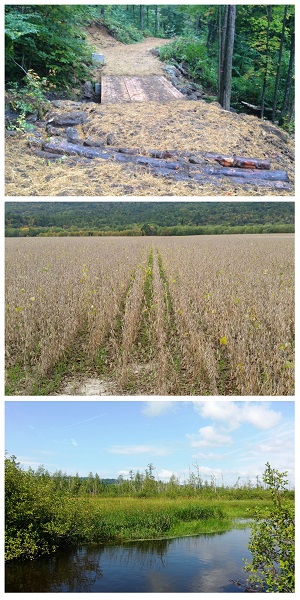
The Vermont Department of Environmental Conservation's Regional Conservation Partnership Program (RCPP) is a 5-year financial assistance program to increase the implementation of agricultural and forestry best management practices. All Vermont farm and forest landowners are eligible and funding goes directly to landowners for practice implementation and land management.
Unique opportunities through RCPP include the following:
-
Many practices are covered at 100% of the NRCS payment rate
-
RCPP practices are not included in the $450,000 NRCS Farm Bill cap, allowing access to an additional $450,000 of funding
-
RCPP applications are in a separate funding pool, greatly increasing your chance of funding with less competition
-
RCPP provides “land rental payments” – an additional $56/acre if you meet certain criteria for seeding cover crops or managing nutrients on crop fields
The application deadline for this year's RCPP is August 23rd, 2024. To apply, please complete the application above and submit it to your local NRCS office. Landowners who are interested in the RCPP program are encouraged to reach out to Kait Jones, Agricultural Grant Program Coordinator at kaitlyn.jones@vermont.gov, to learn more about upcoming funding rounds.
3273 RCPP: Vermont Water Quality Collaborative Partnership
In 2024 the State of Vermont received a $10.7 million grant from the USDA Natural Resources Conservation Service through the Regional Conservation Partnership Program (RCPP). This is the third RCPP award the Department of Environmental Conservation has received, contributing a total of $36.7 million in assistance to farmers and forest landowners across the state.
The 2024 RCPP will be providing financial and technical assistance for the development and implementation of practices that address the following resource concerns:
-
Concentrated erosion
-
Degraded plant condition
-
Field sediment, nutrient pathogen loss
-
Flood resilience
-
Restoration and long-term protection of habitat
Priority is given to smaller farms and forest operations for practice implementation with a focus on agronomic and forestry water quality, flood resilience and habitat improvement practices. Applicants that address multiple areas of improvement will rank higher. The list of practices approved for funding at a 100% payment rate are available on the NRCS website. Some examples include grazing practices, cover crops, reduced tillage, stream crossing, forest trails and landings, and tree/shrub establishment.
2132 RCPP: Accelerated Implementation of Agricultural and Forestry Conservation Practices
In 2020 the State of Vermont received a $10 million grant through the Regional Conservation Partnership Program (RCPP) to increase the implementation of agricultural and forestry best management practices as well as conservation easements. Funding for easements is still available under the 2132 RCPP.
Applications for this round of funding are due by January 24th, 2025. To apply, please complete the application below and submit it to your local NRCS office. For additional assistance please reach out to kaitlyn.jones@vermont.gov.
Easements
Easements in the RCPP program can be at three levels: highly, moderately, and minimally restrictive. The easement value is determined by a before and after appraisal which is the difference between the fair market value and the value as if the easement were in place.
Landowners are paid a percentage of the appraised value based on the restriction level. Highly restrictive (payment is up to 100% of the appraised value), moderately restrictive (up to 75% of appraised value), and minimally restrictive (up to 50% of appraised value.)
The landowner selects the level of restriction based on their desired future use of the property. Additionally, any water quality related restoration work done on the land prior to the easement is funded at 100% of cost for those applying under the highly and moderately restriction levels.
Agricultural and Forestry Easements
Agricultural and forestry easements have greater flexibility than traditional NRCS ACEP-ALE (Agricultural Conservation Easement Program - Ag Land Easement) and can include more forestry protection. (Image, center right, of a riparian buffer along the Missisquoi River. Photo credit: Vermont Land Trust.)
Wetland Easements
Wetland easements are prioritized based on size, recognizing the need for protection on smaller wetlands (priority is given to projects between 10-50 acres.) Only passive restoration (e.g., tree and shrub plantings) is allowed. Any active restoration projects should consider the ACEP-WRE (Wetland Restoration Easement) program. (Image, bottom right. Photo credit: Vermont Land Trust)
Eligibility
All Vermont farm and forest landowners are eligible, however strong priority for agricultural practice funding is given to small farmers (CSFO and SFO.) Easement prioritization is based on water quality protection value and availability of funding.
Class IV roads and municipalities are not eligible to receive these funds.
Resources
Landowners who are interested in this RCPP program are encouraged to reach out to Kait Jones, Agricultural Grant Program Coordinator, Vermont Department of Environmental Conservation, kaitlyn.jones@vermont.gov, 802-505-1635.
Other RCPP Opportunities
USADA/NRCS has funded additional RCPP projects that impact Vermont landowners. Project details and links to further information are available on the NRCS website.

